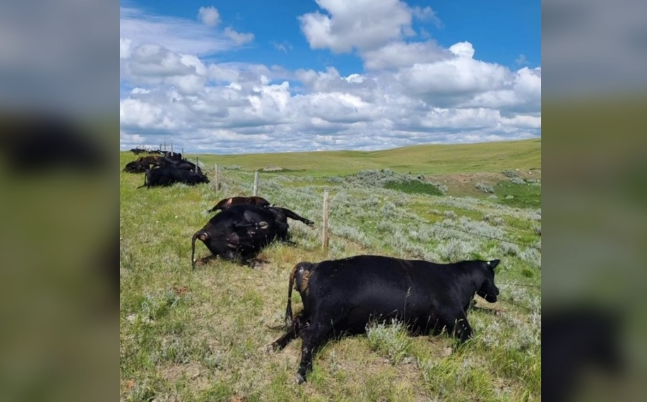Lightning strike kills 27 cows in freak accident
‘We didn’t just lose the cows that are laying there. There’s babies inside of them’

Your support helps us to tell the story
From reproductive rights to climate change to Big Tech, The Independent is on the ground when the story is developing. Whether it's investigating the financials of Elon Musk's pro-Trump PAC or producing our latest documentary, 'The A Word', which shines a light on the American women fighting for reproductive rights, we know how important it is to parse out the facts from the messaging.
At such a critical moment in US history, we need reporters on the ground. Your donation allows us to keep sending journalists to speak to both sides of the story.
The Independent is trusted by Americans across the entire political spectrum. And unlike many other quality news outlets, we choose not to lock Americans out of our reporting and analysis with paywalls. We believe quality journalism should be available to everyone, paid for by those who can afford it.
Your support makes all the difference.A family claims it lost 28 cattle to a lightning strike, said to be a “rare occurence” in Canada’s southwest Saskatchewan province.
The family of farmers who owned the cattle were heartbroken and described the tragedy as “the worst thing” they have ever seen on their farm.
Farm owner Glen Briere recalled when he reached the spot, it “made me sick to my stomach to see what I had seen”.
The family said the weather had become stormy on Friday and they had found the dead cattle two days later.
“It was Friday night when that storm we had had very severe lightning. The [lightning] most definitely hit the fence,” Mr Briere said.
There were 14 cows, 13 calves and one herd sire dead along a fence in their pasture, CTV News reported.
Mr Briere and his wife were out of town when the lightning killed the cattle. His brother-in-law checked in on the cows on Sunday when he found them dead.
Local media reported that the family now faces financial loss due to the death of their cattle apart from the emotional toll the deaths have taken on them.
In several photos and videos, many of the animals can be seen intertwined with the fence. Mr Briere said some appeared to have been struck and blown away from the fence.
“A guy tries to build up for years and years. You get a cow herd built up and then something like this comes along. Naturally, it always takes some of the better ones, which happened here,” Mr Briere said.
“We didn’t just lose the cows that are laying there. There’s babies inside of them [sic],” the wife of Mr Briere, Darla was quoted as saying by CTV News.
“And there’s mothers now that don’t have babies and there’s babies that don’t have mothers [sic]. It affects the whole herd.”
Only the herd sire among the cattle was insured, the family said.
However, the Brieres are in the process of researching resources that could help them recover some of their financial loss. It was reported that they have AgriStability coverage and are hoping that will help.
AgriStability is a business risk management programme under the Canadian Agricultural Partnership.
“It protects Canadian producers against large declines in farming income for reasons such as production loss, increased costs and market conditions,” according to its website.
In a statement, Saskatchewan’s agriculture ministry said lightning strikes causing death in livestock is a “rare occurrence” in the province.
“If cattle are found suddenly dead, producers should inform their local veterinarian,” the statement said.
“Postmortem examination by a veterinarian or veterinary pathologist is required to confirm the cause of death, as lightning strikes can look similar to other causes of abrupt and large die-offs in cattle including anthrax.”
Join our commenting forum
Join thought-provoking conversations, follow other Independent readers and see their replies
Comments